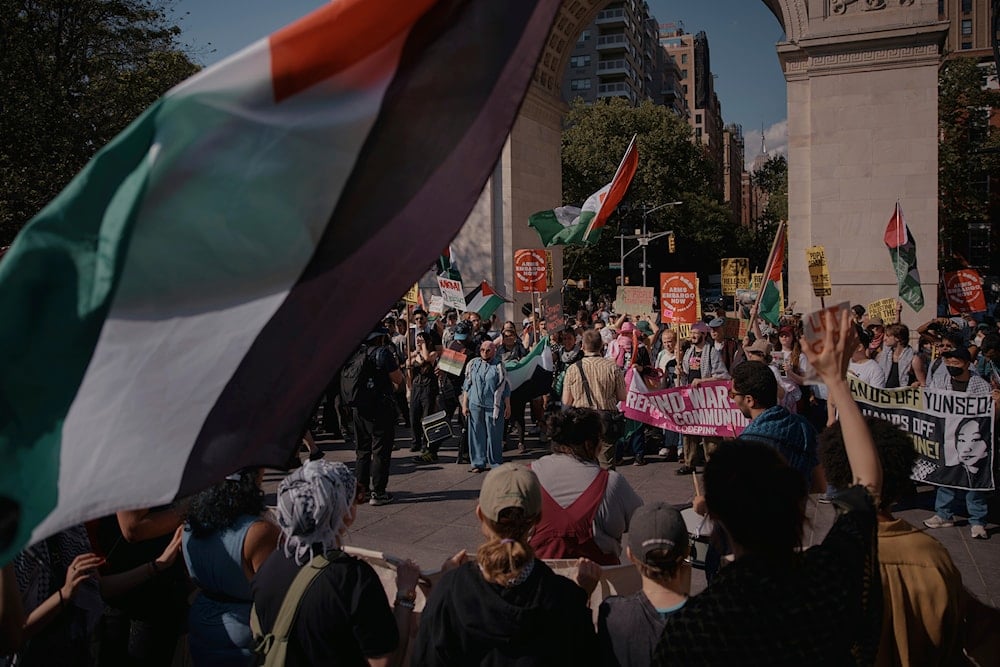Trial begins over Trump-era deportations of pro-Palestine students
The case challenges what plaintiffs call a coordinated effort to silence pro-Palestinian voices on US campuses through arrests, visa revocations, and intimidation.
-

Pro-Palestinian protestors arrive at Washington Square Park during a march in New York on May 17, 2025, to commemorate Nakba. (AP Photo/Andres Kudacki)
A landmark trial is set to begin on Monday in Boston, marking one of the first courtroom tests of President Donald Trump’s sweeping immigration policies, this time centered on charges of politically motivated deportations, targeting international students and scholars engaged in pro-Palestinian advocacy.
The two-week, non-jury trial, brought by major academic organizations, including the American Association of University Professors and the Middle East Studies Association, will examine whether the Trump administration violated constitutional free speech protections in its efforts to deport foreign nationals perceived as critics of "Israel."
Unlike the majority of immigration-related lawsuits that have been dismissed or settled early, US District Judge William Young ordered this case to trial, saying it offered "the best way to get at truth."
Arrests tied to pro-Palestinian speech
The lawsuit centers on the arrest of Mahmoud Khalil in March, a recent Columbia University graduate, who became the first known individual detained under an executive directive that Trump issued in January. That directive instructed federal agencies to identify and deport non-citizens who “espouse hateful ideology,” a phrase critics say was used to conflate pro-Palestinian activism with extremism.
Since Khalil’s arrest, the plaintiffs argue, hundreds of visas have been revoked, and at least a dozen international students and scholars detained. Among them is Rumeysa Ozturk, a Tufts University student arrested by masked federal agents after co-authoring an op-ed critical of her university’s alignment with "Israel" during its war on Gaza.
The case stresses that these actions form part of a coordinated government campaign, led by the State Department and Department of Homeland Security, to punish protected political speech under the guise of national security.
Free speech at the heart of legal showdown
Several detained students have since been released after courts ruled their First Amendment rights had been violated. Now, these earlier legal victories are forming the foundation of this broader challenge, which has drawn national attention amid escalating campus tensions over the ongoing Israeli genocide in Gaza.
The plaintiffs assert that Trump’s immigration orders, paired with public comments from senior officials, reveal a systematic effort to suppress dissent. Secretary of State Marco Rubio stated in March that more than 300 visas had been revoked and vowed to keep pursuing “these lunatics.”
The administration, however, has denied the existence of any formal policy. “We don’t deport people based on ideology,” claimed Tricia McLaughlin, a spokesperson for the Department of Homeland Security.
Despite those public remarks, the administration maintains in court filings that “no statute, rule, regulation or directive” substantiates the plaintiffs’ claims.
Judge skeptical of government’s narrative
Presiding over the case is Judge William Young, an 84-year-old Reagan appointee known for his robust defense of the courtroom trial process. He has already signaled deep concern about the underlying allegations, calling the described policy “hard to imagine as anything but a targeted attempt to intimidate individuals from engaging in protected political speech.”
If the court finds that the deportations violated constitutional protections, a second phase will determine what remedies should be imposed.
The case is only the second Trump-era trial heard by Judge Young. Last month, he ruled in favor of civil rights groups challenging the termination of hundreds of federal research grants by the Trump administration, finding that the cuts unlawfully targeted projects centered on diversity and inclusion.
With the spotlight now on academic freedom and civil liberties, this trial is expected to set a powerful precedent for how far a sitting administration can go in policing political expression among non-citizens.
Read next: Zionist group sending Trump list of pro-Palestine students to deport

 4 Min Read
4 Min Read










